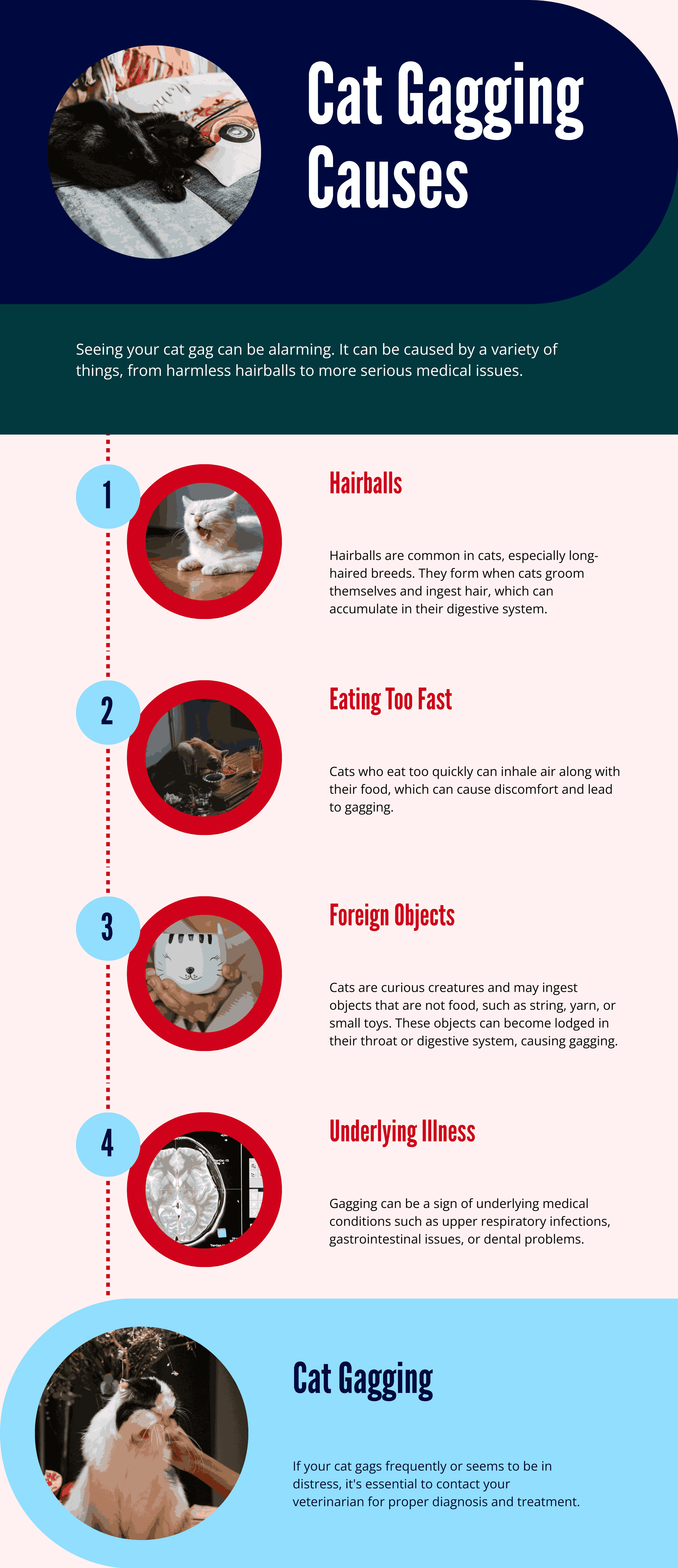Seeing your cat gagging can be scary, especially if it looks serious. Many cat owners have watched their fur baby hunched on a brand-new rug, making a strange noise as if they’re about to vomit. This is often normal and may be caused by a hairball.
Cats have a strong reflex that triggers when something irritates their throat, causing them to gag, widen their mouth, or crane their neck. Usually, this natural bodily function helps them expel things like feathers or small bits of toys. But if the gagging is consistent with other symptoms, like vomiting, a visit to the vet might be necessary.
If your cat gags more than once or twice a day, it could point to problems like heart disease or a respiratory disorder. This gagging could signal a medical condition, so it’s important to call your veterinarian for a checkup to determine if an intervention is needed.

Why is my cat gagging? Straightforward Answer!
How to tell if Your Cat is Actually Gagging?
If your cat is not drinking water and shows signs of gagging, it’s important to understand the difference between coughing and gagging. While both may seem similar, they are quite different actions. Coughing is a strong, abrupt ejection of air from the lungs, often a symptom of a disease or medical issue. On the other hand, gagging involves a choking sound and is usually triggered by something irritating the throat or airway, like fluids, foreign objects, or even hairballs that your cat has swallowed.
A gagging reflex happens when the body tries to quickly reject something ingested or that has moved up from the esophagus, stomach, or lungs. When a cat grooms itself, it swallows hair, which accumulates in the stomach and may lead to a hairball. In this case, your cat may sit low to the ground, extend its neck, and make rhythmic movements until the hairball is expelled. Unlike this normal process, gagging tends to be more disorganized and can be accompanied by yowls or frantic movements, indicating discomfort.
If your cat seems panicked while gagging, especially if they are unable to breathe or seem to have something obstructing their airways, this is a dangerous situation requiring urgent care. A trip to the vet may be necessary, especially if there’s a risk of a serious blockage or emergency. Keep an eye on how often these episodes occur and if your cat’s routine changes, such as when the cat is not drinking water, as this could signal a deeper problem.

Potential Reasons Why Your Cat is Gagging
If your cat is gagging, it can be worrying and puzzling. This reflex is quite common and can be triggered by various things. It’s essential to understand the reasons behind it so you can help your cat and prevent any serious issues. Below are several causes of cat gagging, each with its unique triggers and symptoms.

Hairballs and Grooming
One of the most common reasons for cat gagging is the presence of hairballs. Cats, especially longhaired ones, tend to groom themselves a lot, and during this process, they swallow fur. This fur forms clumps in their digestive tract. Cats may gag as their bodies try to expel these hairballs. Using hairball preventatives like gel, Vaseline for cats, or vegetable fiber in their cat food can help them digest and eliminate these hairballs more easily.
Foreign Objects and Gag Reflex
Sometimes, a foreign object such as string, fishing line, or even tinsel can get stuck in your cat’s throat, leading to gagging. Cats are curious creatures and may accidentally swallow or chew on things they shouldn’t. These objects can trigger the gag reflex as their body tries to remove them. This situation can become an emergency if it leads to an obstruction in the throat or stomach. In such cases, it’s vital to consult a vet immediately.
Eating Too Quickly or Overeating
Cats that overeat or eat too quickly may also gag. When they consume food fast, they don’t chew properly, causing food to get stuck or trigger gagging. You can try feeding them small meals using a slow feeder or placing obstacles in their bowl to slow down their eating. This will help prevent overeating, which can also lead to vomiting and intestinal upset.
Food Allergies and Intolerance
Food allergies or intolerant reactions to certain cat food can also be the culprit behind frequent gagging. Cats can be sensitive to certain foods, and this can cause nausea, vomiting, or even gagging. Identifying the right food for your cat’s nutritional needs and sticking to an appropriate diet can prevent these symptoms. If your cat continues to gag or has intestinal upset, consult a vet for a potential dietary change.
Respiratory Issues and Allergens
Respiratory problems like bronchitis, asthma, or exposure to allergens such as dust can lead to gagging. Cats with these conditions may have difficulty breathing, and gagging becomes a secondary reflex. If your cat is frequently coughing or gagging due to respiratory issues, a visit to the vet is crucial for diagnosis and treatment, which could involve medications or managing the environment to reduce allergens.
Toxic Substances
If your cat accidentally ingests something toxic, such as household cleaners, toxic plants like asparagus fern, or even table scraps that their bodies can’t tolerate, it can trigger gagging, vomiting, and more severe symptoms. Keep harmful items away from your cat, and if you suspect they’ve consumed something dangerous, call your emergency vet or a poison helpline right away.
Gastrointestinal Issues
Cats that suffer from gastrointestinal problems such as inflammatory bowel disease or intestinal harm may gag due to nausea or digestive discomfort. If your cat gags frequently and shows other signs like weight loss, diarrhea, or vomiting, these could be indicators of a more significant issue that needs vet attention. Managing these conditions may require special diets, medications, or supplements.
Heart Disease and Related Conditions
Certain conditions like heart disease, specifically cardiomyopathy, can cause gagging as a symptom. Cats with acquired heart problems might also experience coughing, lack of energy, and even swollen abdomens due to fluid buildup. Regular check-ups with the vet can help detect these illnesses early and manage them before they become life-threatening.
Hormonal Imbalances
Though less common, hormonal issues like hyperthyroidism can sometimes cause cats to gag. If your cat shows symptoms like increased appetite, diarrhea, or vomiting, along with gagging, this could be linked to an underlying hormonal disorder. Consult your vet for appropriate tests and treatments.
Stress and Anxiety
Excessive grooming, caused by stress or behavioral issues, can lead to frequent gagging. Cats that are anxious may overgroom, leading to hair ingestion and, consequently, gagging on hairballs. Managing your cat’s stress through environmental changes, calming products, or interactive toys can reduce both overgrooming and the associated gagging.
What to Do if Your Cat is Gagging?
If your cat is gagging, it can be a sign of something serious or just a common issue like hairballs. Here are some steps to help:
- Check the airways: Gently move your cat’s tongue forward and look for any foreign objects, such as string or ribbon. If you find anything, contact the vet or an emergency vet right away instead of trying to remove it yourself to avoid causing more harm.
- Use a slow feeder: If your cat tends to eat too fast, consider using a slow feeder with raised sections to slow down their eating. This helps reduce gagging and vomiting from overeating or eating too quickly.
- Watch for signs of sickness: If your cat has been exposed to a toxic substance or seems nauseated, watch for other symptoms like vomiting or coughing. If these signs appear, take your cat to the vet immediately for further diagnosis and treatment.
These steps can help manage and prevent gagging in your cat, but always consult a vet if you’re unsure about the cause.
Final Takeaway
As a cat parent, it’s essential to watch for symptoms when your cat is gagging. Usually, it’s due to a hairball, but if the gagging persists or is paired with vomit or being hunched to the ground for a long time, it may signal an underlying health issue. In such cases, you should take your cat to the vet and pay attention to their body language and overall wellness.
This article has discussed the common causes of gagging, from mild hairball incidents to more serious problems. If gagging is frequent or causes pain, your veterinarian can help figure out the cause and provide potential treatments to keep your cat healthy and happy.
FAQs
Why does my cat gag but not throw up?
If your cat is gagging frequently but not throwing up, it could mean something is stuck in their throat, stomach, or intestines. This could be due to the ingestion of a foreign object, which requires immediate attention from an urgent care vet or emergency vet. It’s important to get them treated quickly to avoid a serious emergency.
When should I worry about my cat gagging?
If your pet continues to gag, refuses to eat, or seems lethargic and is hiding, an exam is strongly recommended. You should also watch for other signs like breathing changes, especially fast or open-mouth breathing, or any neurologic signs such as acting drunk or being off-balance. These symptoms may indicate a more serious issue.
How do I help my cat stop gagging?
To treat your cat for gagging caused by medical problems, take them to the vet and administer the right medication. If hairballs are the cause, try feeding special food to help them digest better and groom them regularly. You can also massage their throat to help them swallow more easily.
Why is my cat gagging and can’t meow?
If your cat is gagging and seems to lose their voice, it could be due to laryngitis from infectious diseases like upper respiratory infections, cat cold (URI), calicivirus, or rhinotracheitis. Other conditions, such as inhaled irritants like smoke or dust, might also cause these symptoms. It’s important to consult a vet for the best care.

